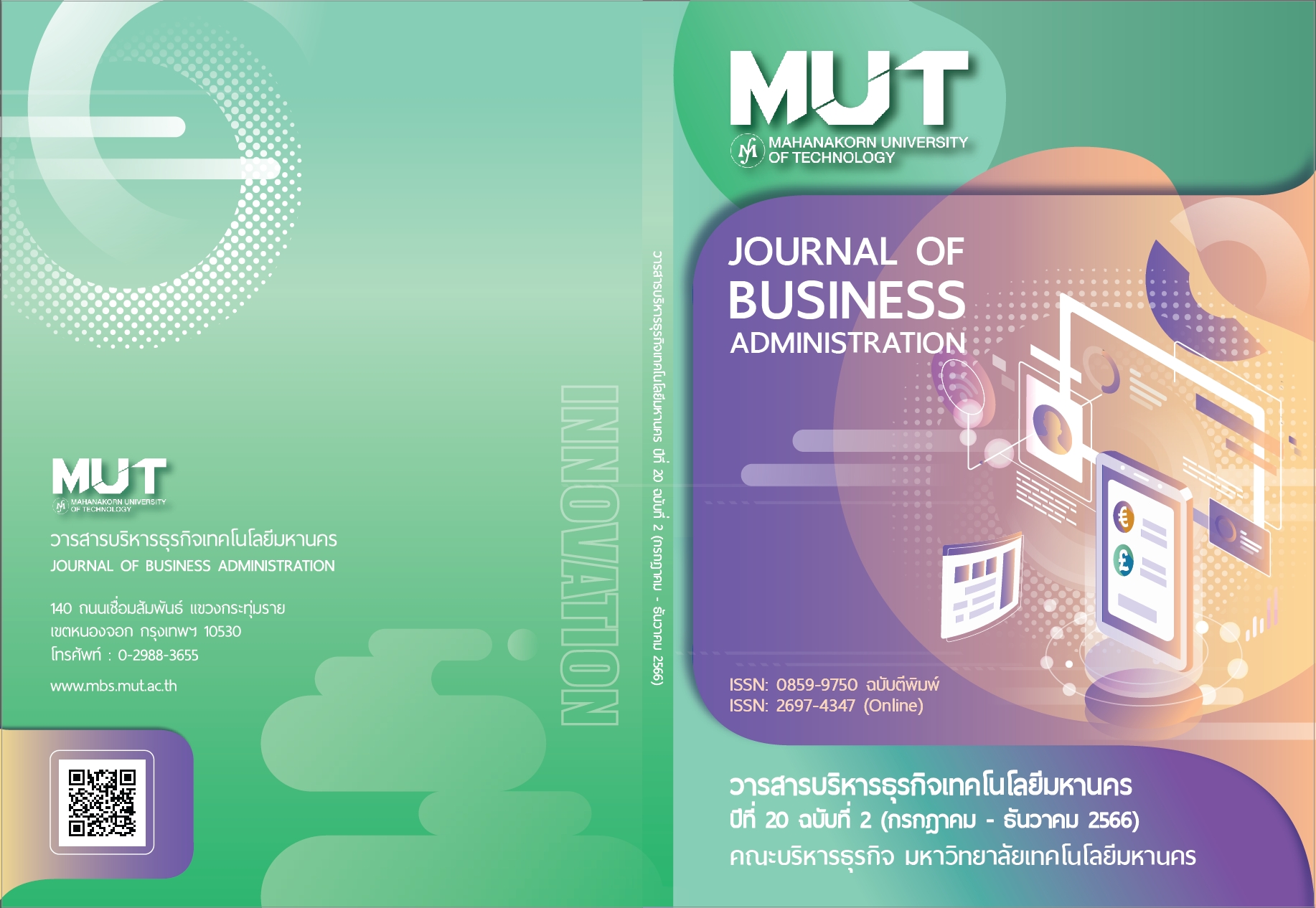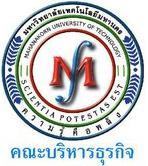The Influence of Innovative Leadership on the Competitive Ability of Startup Businesses in Nonthaburi Province
Keywords:
Development, Innovation leadership, Competitiveness, Startup businessAbstract
This research aimed to 1) investigate the influence of innovative leadership on the competitive capabilities of startup businesses, and 2) develop guidelines for enhancing the impact of innovative leadership on the competitive abilities of startup businesses in Nonthaburi Province. The research population was divided into two groups. The first group consisted of 250 startup business owners in Nonthaburi Province, while the second group comprised three groups of experts, 15 individuals in total. The research employed two research instruments: questionnaires and interviews, using an assessment questionnaire. Data analysis employed statistical techniques, including structural equation modelling, percentages, standard deviations, and content analysis.
The research findings revealed that 1) the analysis of the linear structural equation model on the influence of innovative leadership on the competitive capabilities of startup businesses in Nonthaburi Province indicated a good fit with the data, as evidenced by (1) the Chi-square Probability Level (CMIN-p) of 69.249, (2) the Relative Chi-square (CMIN/df) of 1.332, (3) the Goodness of Fit Index (GFI) of .969, and (4) the Root Mean Square Error of Approximation (RMSEA) of .036. It was found that factors contributing to innovative leadership, including variables related to vision creation, change promotion, vision dissemination, and exemplary leadership, played a significant role. Direct causal factors influencing competitiveness included variables related to innovation, marketing, and quality, with cumulative effects in the same direction. 2) This study has developed four pathways for enhancing the impact of innovative leadership on the competitive abilities of startup businesses in Nonthaburi Province as follows: Pathway 1: Factors related to innovative leadership, Pathway 2: Factors related to the organizational innovation environment, Pathway 3: Factors related to teamwork and participation, and Pathway 4: Factors related to ethical considerations.
References
Annunzio, S. 2001. E-leadership. Training. Vol. 38. No. 6. 67 - 69.
Beal, R. M. and M. Yasai-Ardekani. 2000. Performance Implications of Aligning CEO Functional Experiences with Competitive Strategies. Journal of Management. Vol. 26. No. 4. 733 - 762.
Benjamas, S. and Rokkhitthammoth, P. 2020. Developing a Buddhist environmental system for new startup entrepreneurs in Nakhon Ratchasima province. Journal of Roi Kaensarn Academi. Vol. 5. No. 2. 67 - 84.
Blank, S. 2017. Why You Can’t Just Tell a Company “Be More Like a Startup”. Harvard Business Review. June 2017.
Bohan, G.P. and Horney, N.F. 1991. Pinpointing the real cost of quality in a service company. National Productivity Review. Summer. 309 - 317.
Brands, R. and Jeff, Z. 2010. Fraud, Innovation and Societal Cost of Business Gone Bad. Retrieved February 22, 2023 from http://www.innovationcoach.com/fraud-innovation-and-societal-cost-of-business-gonebad.html
Campanella, J. 1990. Principles of quality costs. 2nd ed. Milwaukee, WI: ASQC Quality Press.
Chonintra, P. 2018. Podcasts, new alternative media: A comparative study between the United States and Thailand. Journal of Academic Studies. Vol. 3. No. 3. 272 - 289.
Cronbach, L. J. 2001. Essentials of psychological testing. 5th ed. New York: Harper Collins.
Fusch, P. I. and Ness, L. R. 2015. Are We There Yet? Data Saturation in Qualitative Research. The Qualitative Report. Vol. 20. No. 9. 1408 - 1416. Retrieved January 30, 2023 from https://nsuworks.nova.edu/tqr/vol20/iss9/3/
The Global Entrepreneurship and Development Institute. 2016. GEDI: The Global Entrepreneurship Index 2016. Retrieved January 30, 2023 from http://thegedi.org/countries/thailand
Gavett, G. 2017. The Steep Psychological Price of Starting Your Own Company. Harvard Business Review. n.d.
Grant, R. M. 1991. Contemporary strategy analysis. Cambridge, MA: Blackwell Publishers.
Guest, G., Bunce, A. and Johnson, L. 2006. How many interviews are enough? An experiment with Data Saturation and variability. Field Methods. Vol. 18. No. 1. 59 - 82.
Hair, J. F., Black, W. C., Babin, B. J. and Anderson, R. E. 2010. Multivariate data analysis: a global perspective. 7th ed. Upper Saddle River. NJ: Pearson Prentice Hall.
Hongcharoensukchai, K. 2020. Characteristics of successful startup entrepreneurs in Thailand. Journal of Politics, Administration and Law. Vol. 12. No. 1. 261 - 278.
Jorge, P-M, María, D. L-G and Eva, M. P-O. 2015. The effects of quality and environmental management on competitive advantage: A mixed methods study in the hotel industry. Tourism Management. Vol. 50. No. 15. 41 - 54.
Kalyanavancha, G. 2014. Structural equation analysis (SEM) with AMOS. Bangkok: Samlada.
Kay, A. L. and Gulzar, H. S. 2016. An Iterative, Low-Cost Strategy to Building Information Systems Allows a Small Jurisdiction Local Health Department to Increase Efficiencies and Expand Services. Journal of Public Health Management and Practice. Vol. 22. No. 6. 95 - 100.
Kritametthasiri, G. 2011. Analysis of factors using SPSS and AMOS for research. Bangkok:
CEDU.
Leonidas, C. L., Thomas, A. F., Paul, C., Stavroula, S. and Constantine, S. K. 2015. Environmentally friendly export business strategy: Its determinants and effects on competitive advantage and performance. International Business Review. Vol. 24. 798 - 811.
McKeen, J. D. and Smith, H. A. 2003. Making IT Happen: Critical Issues in IT Management. Ontario: Wiley.
Nonthaburi Provincial Industry Office. 2019. Annual report 2018. Nonthaburi: Nonthaburi Provincial Industry Office.
Nonthaburi Provincial Office. 2020. 4-year development plan for Nonthaburi province (2018-2021). Review version 2020. Nonthaburi: Nonthaburi Provincial Office.
Office of the National Economic and Social Development Council/National Economic and Social Development Board. 2019. Annual report 2018. Bangkok: National Statistical Forecasting Bureau.
Oranong, R. 2010. Development of an innovative leadership model. Doctoral dissertation. National Institute of Development Administration.
Porter, M. E. 1980. Competitive strategy. New York: Free Press.
Pulley, M. L., Sessa, V. and Malloy, M. 2002. E-leadership: a two-pronged idea. Training and Development. 35 – 47.
Schmidt, G.M. and Porteus, E.L. 2000a. The impact of an integrated marketing and manufacturing innovation. M and SOM. Vol. 2. No. 4. 317 – 336.
Schmidt, G.M. and Porteus, E.L. 2000b. Sustaining-technology leadership can require both cost competence and innovative competence. M and SOM. Vol. 2. No. 1. 1 – 18.
Startup Thailand Center: National Innovation Agency. 2018. Somkid orders a budget of 10 billion to develop Start Up Hub. Retrieved February 17, 2023 https://www.startupthailand.org/somkid-orders-b10bn-spent-onstartup-fund-th/
Techsauce. 2017. Thailand Tech Startup Report Q1 2017. Retrieved February 14, 2023 https://techsauce.co/report/thailand-tech-startup-ecosystem%E2%80%8B-q1-2017/
Weiss, D. S. and Legrand, C. 2011. Innovative Intelligence: The Art and Practice of Leading Sustainable Innovation in Your Organization. Ontario: Friesens.
Downloads
Published
Issue
Section
License

This work is licensed under a Creative Commons Attribution-NonCommercial-NoDerivatives 4.0 International License.
ข้อความ ข้อคิดเห็น ข้อมูล เนื้อหา รูปภาพ แผนภูมิ แผนผัง เป็นต้น ที่ปรากฏและแสดงในบทความต่างๆ ในวารสารบริหารธุรกิจเทคโนโลยีมหานคร ถือเป็นความรับผิดชอบโดยตรงของผู้เขียนบทความนั้นๆ มิใช่เป็นความรับผิดชอบใดๆ ของวารสารบริหารธุรกิจเทคโนโลยีมหานคร และมหาวิทยาลัยเทคโนโลยีมหานคร
บทความที่ตีพิมพ์ในวารสารบริหารธุรกิจเทคโนโลยีมหานคร ถือเป็นลิขสิทธิ์เฉพาะของคณะบริหารธุรกิจ มหาวิทยาลัยเทคโนโลยีมหานคร หากบุคคลหรือหน่วยงานใดต้องการนำทั้งหมดหรือส่วนใดส่วนหนึ่งไปเผยแพร่ต่อหรือเพื่อกระทำการใดๆ จะต้องได้รับการอนุญาตเป็นลายลักษณ์อักษรจากคณะบริหารธุรกิจ มหาวิทยาลัยเทคโนโลยีมหานครก่อนเท่านั้น


